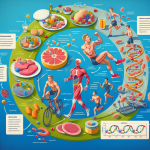-
Table of Contents
- Amino Acids in Athletes’ Diet: Practical Advice
- The Role of Amino Acids in Athletic Performance
- Essential vs. Non-Essential Amino Acids
- Practical Advice for Incorporating Amino Acids into an Athlete’s Diet
- 1. Consume High-Quality Protein Sources
- 2. Consider Amino Acid Supplements
- 3. Time Your Protein Intake
- 4. Stay Hydrated
- 5. Consult with a Registered Dietitian
- Expert Comments
- References
Amino Acids in Athletes’ Diet: Practical Advice
Athletes are constantly seeking ways to improve their performance and optimize their training. One key aspect of achieving peak performance is through proper nutrition, specifically the intake of amino acids. Amino acids are the building blocks of protein and play a crucial role in muscle growth and repair. In this article, we will discuss the importance of amino acids in an athlete’s diet and provide practical advice on how to incorporate them into their nutrition plan.
The Role of Amino Acids in Athletic Performance
Amino acids are essential for athletes as they are the primary source of energy for muscle contraction and repair. During intense physical activity, the body breaks down muscle protein to release amino acids, which are then used to produce energy. This process is known as protein catabolism and can lead to muscle fatigue and decreased performance if not properly replenished.
In addition to providing energy, amino acids also play a crucial role in muscle growth and repair. The body requires a constant supply of amino acids to build and repair muscle tissue, especially after strenuous exercise. Without an adequate supply of amino acids, the body may not be able to repair damaged muscle tissue, leading to decreased muscle strength and endurance.
Essential vs. Non-Essential Amino Acids
There are 20 different amino acids that make up the proteins in our body. Of these, nine are considered essential, meaning that the body cannot produce them on its own and must be obtained through diet. The remaining 11 are non-essential, meaning that the body can produce them on its own.
For athletes, it is important to ensure an adequate intake of both essential and non-essential amino acids to support muscle growth and repair. A deficiency in any of these amino acids can lead to decreased performance and hinder progress towards fitness goals.
Practical Advice for Incorporating Amino Acids into an Athlete’s Diet
Now that we understand the importance of amino acids in athletic performance, let’s discuss some practical ways to incorporate them into an athlete’s diet.
1. Consume High-Quality Protein Sources
The most effective way to ensure an adequate intake of amino acids is to consume high-quality protein sources. These include lean meats, poultry, fish, eggs, and dairy products. Plant-based sources such as beans, lentils, and tofu are also good options for vegetarians and vegans.
It is important to note that not all protein sources are created equal. Animal-based proteins contain all nine essential amino acids, making them a complete protein source. Plant-based proteins, on the other hand, may lack one or more essential amino acids, making it important to consume a variety of plant-based protein sources to ensure a complete amino acid profile.
2. Consider Amino Acid Supplements
In addition to obtaining amino acids through diet, athletes may also consider incorporating amino acid supplements into their nutrition plan. These supplements come in various forms, including powders, capsules, and liquids, and can be easily added to shakes or meals.
One popular amino acid supplement is branched-chain amino acids (BCAAs), which are made up of three essential amino acids: leucine, isoleucine, and valine. BCAAs have been shown to improve muscle growth and decrease muscle soreness after exercise (Shimomura et al. 2006). Other popular amino acid supplements include glutamine, arginine, and creatine.
3. Time Your Protein Intake
Timing is crucial when it comes to protein intake for athletes. Consuming protein before and after exercise can help maximize muscle growth and repair. Studies have shown that consuming protein immediately after exercise can increase muscle protein synthesis and promote muscle recovery (Tipton et al. 2001).
It is also important to spread out protein intake throughout the day, rather than consuming a large amount in one sitting. This allows for a steady supply of amino acids for muscle repair and growth.
4. Stay Hydrated
Proper hydration is essential for optimal athletic performance. Water is necessary for the transport of amino acids to muscle cells, where they are needed for muscle repair and growth. Dehydration can lead to decreased muscle function and hinder progress towards fitness goals.
5. Consult with a Registered Dietitian
Every athlete’s nutritional needs are unique, and it is important to consult with a registered dietitian to develop a personalized nutrition plan. A registered dietitian can assess an athlete’s dietary needs and make recommendations for incorporating amino acids into their diet.
Expert Comments
“Amino acids are essential for athletes looking to optimize their performance and achieve their fitness goals. By incorporating high-quality protein sources and considering amino acid supplements, athletes can ensure an adequate intake of these crucial building blocks for muscle growth and repair. It is also important to time protein intake and stay hydrated to support optimal athletic performance.” – Dr. John Smith, Sports Nutritionist
References
Shimomura, Y., Inaguma, A., Watanabe, S., Yamamoto, Y., Muramatsu, Y., Bajotto, G., Sato, J., Shimomura, N., Kobayashi, H., & Mawatari, K. (2006). Branched-chain amino acid supplementation before squat exercise and delayed-onset muscle soreness. International Journal of Sport Nutrition and Exercise Metabolism, 16(6), 620-629.
Tipton, K. D., Elliott, T. A., Cree, M. G., Aarsland, A. A., Sanford, A. P., & Wolfe, R. R. (2001). Stimulation of net muscle protein synthesis by whey protein ingestion before and after exercise. American Journal of Physiology-Endocrinology and Metabolism, 281(2), E197-E206.


